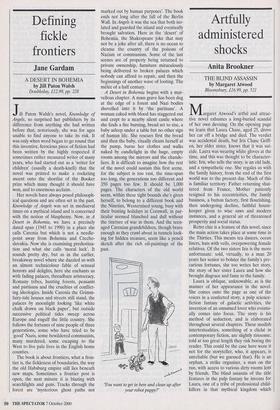Defining fickle frontiers
Jane Gardam
A DESERT IN BOHEMIA by Jill Paton Walsh Doubleday, £12.99, pp. 228 Jill Paton Walsh's novel, Knowledge of Angels, so surprised her publishers by its difference from anything she had written before that, notoriously, she was for ages unable to find anyone to take its risk. It was only when word began to go round that this inventive, ferocious piece of fiction had been written by the highly respected if sometimes rather measured writer of many years, who had started out as a 'writer for children' (usually a death-knell) that the novel was printed to make a rocketing ascent onto the shortlist of the Booker prize which many thought it should have won, and to enormous acclaim.
Her novels have always posed philosoph- ical questions and are often set in the past. Knowledge of Angels was set in mediaeval times on a mythical island and is concerned with the notion of blasphemy. Now, in A Desert in Bohemia, we have a precisely dated span (1945 to 1990) in a place she calls Carenia but which is not a needle- point away from Bohemia and Czecho- slovakia. Now she is examining predestina- tion and what she calls 'moral luck'. It sounds pretty dry, but as in the earlier, breakaway novel where she dazzled us with an almost technicolour fable of sensual horrors and delights, here she enchants us with fading palaces, threadbare aristocracy, Romany tribes, hunting forests, peasants and partisans and the cruelties of conflict- ing ideologies. Inside Carenia the Grimm- fairy-tale houses and streets still stand, the palaces by moonlight looking 'like white chalk drawn on black paper', but outside successive political tides sweep across Europe and engulf the little country. She follows the fortunes of nine people of three generations, some who have tried to be `good' Nazis, some bewildered communists, many murdered, some escaping to the West to live pale lives in the English home counties.
The book is about frontiers, what a fron- tier is, the fickleness of boundaries, the way the old Habsburg empire still lies beneath new maps. Sometimes a frontier post is open, the next minute it is blazing with searchlights and guns. Tracks through the forest are 'mysterious ghost paths not marked out by human purposes'. The book ends not long after the fall of the Berlin Wall. In Angels it was the sea that both iso- lated and guarded the island and eventually brought salvation. Here in the 'desert' of Bohemia, the Shakespeare joke that may not be a joke after all, there is no ocean to cleanse the country of the poisons of Nazism or communism. Some of the last scenes are of property being returned to private ownership, furniture miraculously being delivered to broken palaces which nobody can afford to repair, and then the beginnings of another wave of looting. The mêlée of a half century.
A Desert in Bohemia begins with a mar- vellous chapter. A mass grave has been dug at the edge of a forest and Nazi bodies shovelled into it by 'the partisans'. A woman caked with blood has staggered out and crept to a nearby silent castle where she finds a fire burning, bread set to rise, a baby asleep under a table but no other sign of human life. She rescues first the bread and then the baby, ritually cleans herself at the pump, burns her clothes and walks naked by candlelight in the huge, empty rooms among the mirrors and the chande- liers. It is difficult to imagine how the rest of the novel could sustain this first scene, for the subject is too vast, the time-span too long, the generations too different and 350 pages too few. It should be 1,000 pages. The characters of the old world seem, within these tight bounds she's given herself, to belong to a different book and the Nineties, Westernised young, busy with their boating holidays in Cornwall, in par- ticular seemed blanched and dull without the tincture of war in them. And the teen- aged Carenian grandchildren, though brave enough as they crawl about in tunnels look- ing for hidden treasure, seem like a pencil sketch after the rich oil-paintings of the past.
Tou want to get in here and clean up after your robot puppy?'


















































































 Previous page
Previous page